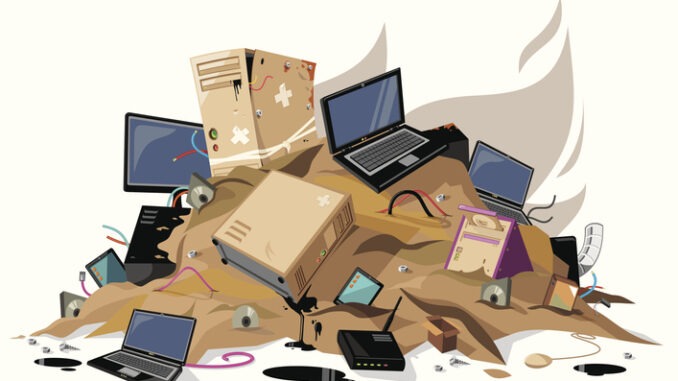Tackling e-waste can cause issues for dealers on two fronts. First, there is the complexity of ensuring compliance with e-waste law. Then there is navigating the commercial balance for dealers in extending device life. Gavin Miller, CEO of Asurion Europe explains
First – let’s look at the law. The Waste Electrical and Electronic Equipment (WEEE) Directive, transposed into UK law in 2007, obliges manufacturers to take financial responsibility for the products they bring to market, specifically when they are discarded. Distributors and retailers are also covered under section 42 of the regulations, in the sense that they must provide a way for customers to dispose of their old devices when they buy a new version of the same type of device.
Rules apply regardless of how the products are sold – remotely or in-store. Retailers with a sales footprint of over four hundred square metres must collect or ‘take back’ small WEEE items free of charge, whether or not the customer buys a new one. Failure to comply can result in a £5,000 fine at a magistrates’ court or an unlimited fine from a Crown Court.
However, for most dealers, there’s a far greater opportunity than simply complying with the law. Most devices will have some level of residual value – even if just for the recovery of materials from the device, like lithium, tungsten and manganese. So, dealers can delight their customers by pointing them towards a trade-in service which will actually return a sum of money in most cases.
That’s likely to help keep the dealer’s image high in mind and appreciation by the customer. Then there’s the trickier commercial balance for dealers over extending device life. Again, selling the customer a maintenance service will, on average, give their device at least an extra year of performance life. On the other hand, it delays a new product sale by a year.
In our experience, smart dealers tend to rate customer loyalty over short-term device churn. In other words, the lifetime value of a loyal customer is a far greater prize than a marginally quicker sale. And in a world where the ability to demonstrate contribution to climate targets, the argument for helping customers prolong the life of their product is even more compelling.
Our recent Asurion Europe study shows that, as a result of extending the life of a smartphone, tablet or laptop device by 12 months and remembering to trade in that device, the carbon footprint of manufacturing replacement devices is reduced by an average of 99kg of CO2e (carbon dioxide equivalent) per person – or over 4.5 million tonnes of CO2e across the UK. That’s equivalent to 0.9% of the UK’s total greenhouse gas emissions.
In conclusion, navigating regulations such as the Waste Electrical and Electronic Equipment (WEEE) Directive presents dealers with both challenges and opportunities. While compliance is essential, proactive measures such as offering trade-in services and extending device lifespan not only enhance customer satisfaction but also contribute significantly to environmental sustainability efforts.




Be the first to comment